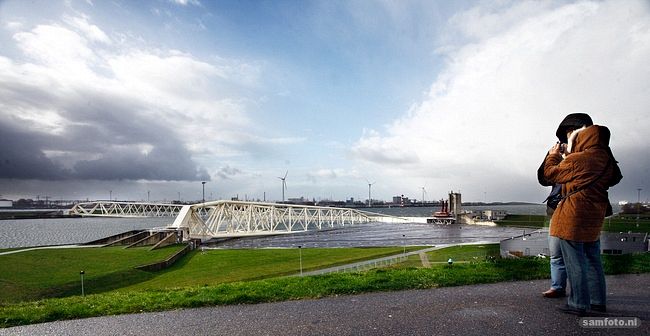At the congress Deltas and Ports of the Future
organised by the Delft Deltas Infrastructures and Mobility Initiative (DIMI) the speakers outlined the complex challenges for successful integrated delta management of the 21st century.
Designing future flood defence systems is a multifaceted challenge, an ongoing process requiring the integrated approach of many perspectives. DIMI Chairman Marcel Hertogh, professor of Integral Design and Civil Infrastructure Management at the faculty of Civil Engineering and Geosciences, said TU Delft has a large role to play in this continuous adaptation. It can develop technologies to monitor, organise and manage the complexities and uncertainties involved. It can also educate future engineers to understand natural processes and build multifunctional, adaptive and resilient infrastructures. After centuries of delta management experience, the Netherlands is the world leader in the field. However the civil engineering community at TU Delft is wary of complacency. The context has shifted due to climate change, environmental degradation, accelerating urbanization and the need to transition to a circular economy and give up fossil fuels.
DIMI vice-chairman Han Meyer, professor of urban design at the faculty of Architecture and the Built Environment, and Cees Veerman, former chair of the Dutch Delta Committee, emphasised that new smart solutions are needed. These should exploit synergies between hydraulic engineering, spatial planning and governance. Henk Ovink, Special Envoy for International Water Affairs for the Netherlands, said exemplary Dutch delta infrastructure rests on the upholding of the two core concepts of safety and quality.
Other voices were more critical. Dale Morris, senior economist at the Dutch Embassy in the USA said yes, Dutch experts have had great impact helping the USA rebuild after Hurricane Katrina in New Orleans and Superstorm Sandy in New York. They did not simply transfer standard solutions. But despite ingenious Dutch input, applying visionary expertise to local problems, sometimes they are perceived as arrogant and too commercially aggressive. Julie Rozenberg, economist at the World Bank Sustainable Development Group, highlighted the urgency of considering the vulnerable potential for poor victims of climate change. Combining actions to mitigate climate change and reduce poverty can be effective at tackling both problems at once.



Comments are closed.